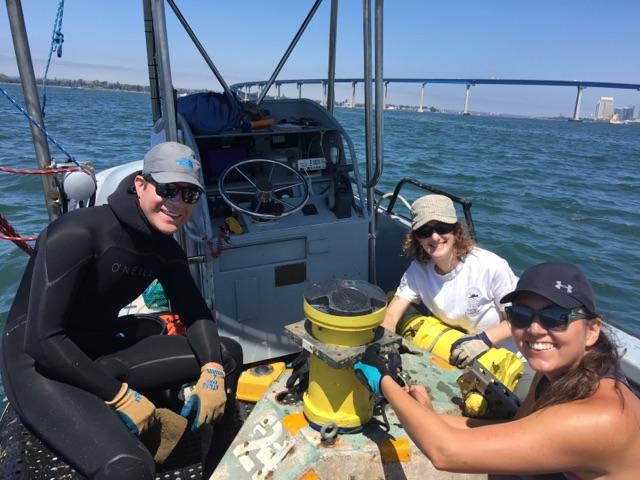This week we’re highlighting postdoctoral scholar Angelica Rodriguez and her current work at the center. Angelica holds a B.S. in Physics with a specialization in earth science and a minor in environmental systems and a PhD in Physical Oceanography from Scripps Institution of Oceanography.
Q: What climate change-related research projects are you working on currently?
A: I study the conditions and physical processes that result in extreme water levels along the San Diego Bay shoreline, as a part of the Resilient Futures San Diego Bay project. We combine in situ wave and water level observations with numerical modeling to provide stakeholders with an extreme event forecast map. The map is based on the best available data, with the ultimate goal of developing a strategy for maintaining regular total water level forecasts in the bay.
Q: What does a typical workday look like for you?
A: I don’t have a very typical schedule. Between doing research, reporting to stakeholders, teaching courses, working with graduate students on their research projects, working for the Scripps Institution of Oceanography academic department on their diversity initiatives, participating in lab and fieldwork for a couple of different research groups, and doing outreach, my days are usually pretty packed. I typically end up jumping from one thing to the next. It gets a little hectic sometimes but I love being able to participate in so many fun and fascinating projects, and I feel fortunate that I’m supported in pursuing them.
Q: How did you get interested in your specific topic, or in science in general?
A: I had the advantage of being surrounded by academic role models doing school work from a young age. My mother got her bachelor’s degree in human resources when I was 5. My brothers are 12 and 14 years older than me, so I always saw the three of them doing schoolwork. I used to pretend that I had homework before I even went to school! That passion for education allowed me to embrace being good at math as a young girl.
I’ve always been into math and physics but biology wasn’t my thing. Sometimes, science felt off-putting. I think it was witnessing my brother go through the engineering program at UCSD that solidified my decision to pursue physics there. As an undergraduate at UCSD, I learned about the details of climate change through my coursework, which ultimately led me down the path of research.
Q: What aspect of your research helps us better understand or adapt to climate change?
A: My research uses state-of-the-art tools and the most up-to-date science to provide managers the information that they need to make critical decisions regarding their coastal infrastructure. By characterizing the risks, we are able to help minimize the physical and economical damages that the stakeholders might incur from an extreme water level event.
Q: What are some surprising things that people might not know about you?
A: People are usually surprised to hear that I am from San Diego – Chula Vista to be more specific. I also lived in Imperial Beach for a few years. Both of these cities border San Diego Bay so I spent a lot of time at the shoreline as a kid. It’s very rewarding to feel like I am doing science that benefits my community.
Thanks for sharing, Angelica!


